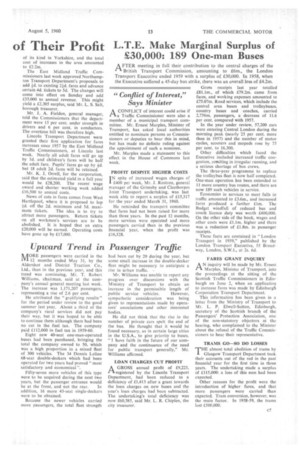Upward Trend in Passenger Traffic
Page 43

If you've noticed an error in this article please click here to report it so we can fix it.
h/fORE passengers were carried in the IVI 12 months ended May 31, by the Aldershot and District Traction Co., Ltd., than in the previous year, and this trend was continuing, Mr. T. Robert Williams. chairman, said at the company's annual general meeting last week. The increase was 1,171,207 passengers, representing a rise of 2.6 per cent.
He attributed the " gratifying results " for the period under review to the good summer last year. About a third of the company's rural services did not pay their way, but it was hoped to be able to continue them although there had been no cut in the fuel tax. The company paid £112,000 in fuel tax in 1959-60.
Eight new 40-seat one-man-operated buses had been purchased, bringing the total the company owned to 50, which was a high proportion in a mixed fleet of 300 vehicles. The 34 Dennis Loline 68-seat double-deckers which had been operated for two years had proved "most satisfactory and economical ".
Fifty-seven more vehicles of this type were to be acquired during the next two years, but the passenger entrance would be at the front, and not the rear. In addition, 16 more 43-seat single-deckers were to be obtained.
Because the newer vehicles carried more passengers, the total fleet strength had been cut by 20 during the year, but some small increase in the double-decker fleet might be necessary to anticipate a rise in urban traffic.
Mr. Williams was unable to report any progress over discussions with the Ministry of Transport to obtain an increase in the permissible length of public service vehicles. However, sympathetic consideration was being given to representations made by operators' associations and other interested bodies.
He did not think that the rise in the number of private cars spelt the end of the bus. He thought that it would be found necessary, as in certain large cities in the U.S.A., to give priority to buses. " I have faith in the future of our company and the continuance of the need for public transport generally," Mr. Williams affirmed.
LOAN CHARGES CUT PROFIT
A GROSS annual profit of £9,223, registered by the Lincoln Transport Department, had been reduced to a deficiency of £1,413 after a grant towards the loan charges on new buses and the year's loan charges had been subtracted. The undertaking's total deficiency was now £60,385, said Mr. L. R. Chiplen, the city treasurer. FARES GRANT INQUIRY A N inquiry will be made by Mr. Ernest Marples, Minister of Transport. into the proceedings at the sitting of the Scottish Traffic Commissioners in Edinburgh on June 2, when an applicatiog to increase fares was made by Edinburgh Corporation Transport Department. This information has been given in a letter from the Ministry of Transport to Mr. L. P. Elwell-Sutton, Edinburgh, secretary of the Scottish branch of the Passengers' Protection Association, one of the non-statutory objectors at the hearing, who complained to the Minister about the refusal of the Traffic Commissioners to hear their representative.
TRAMS, GO—SO DO LOSSES THE almost total abolition of trams by
Glasgow Transport Department took their accounts out of the red in the past financial year for the first time in three years. The undertaking made a surplus of £115,000: a loss of this sum had been expected.
Other reasons for the profit were the introduction of higher fares, and that more passengers were carried than expected. Tram conversion, however, was the main factor. In 1958-59, the trams lost £500,000.




































































































